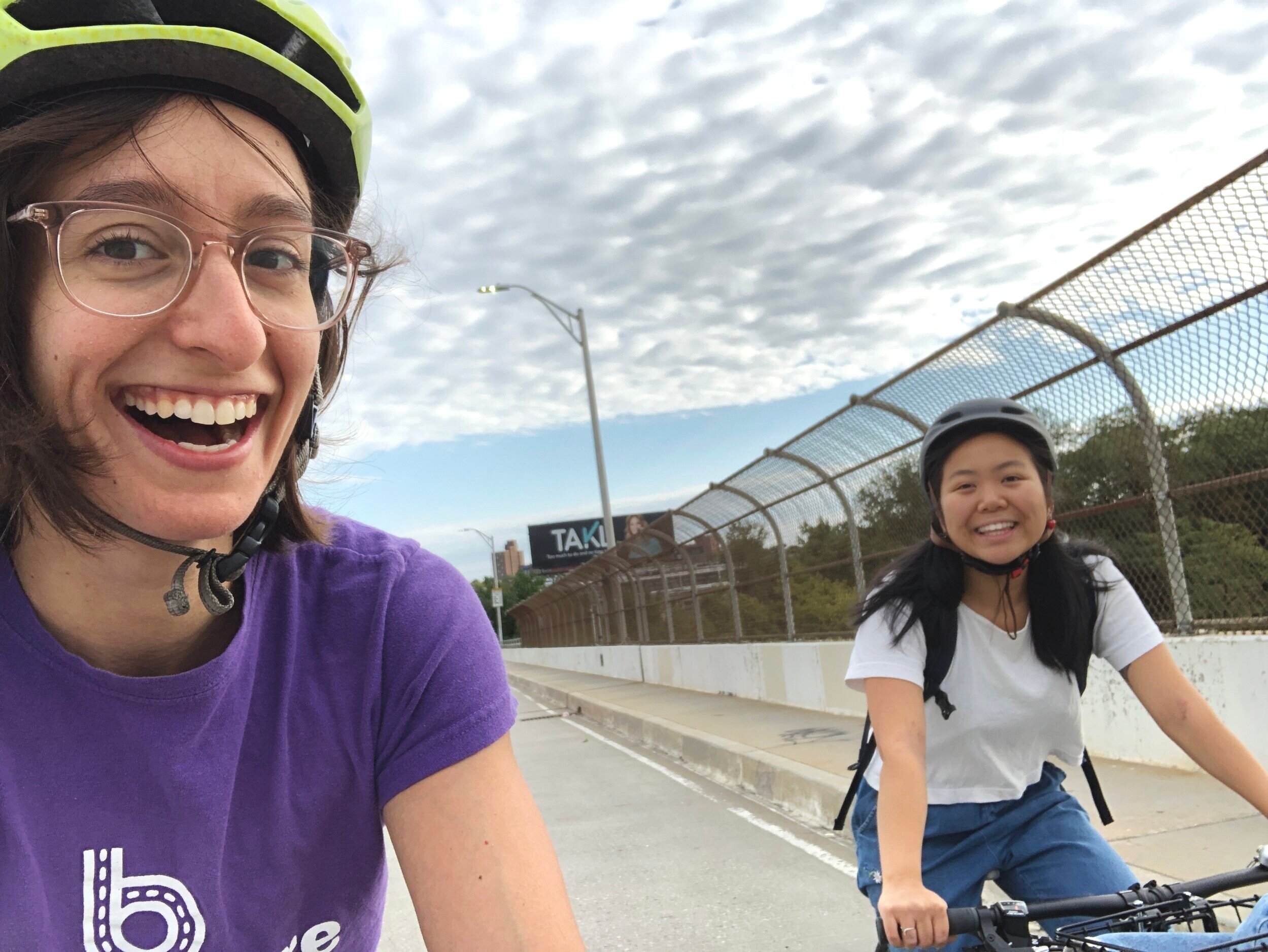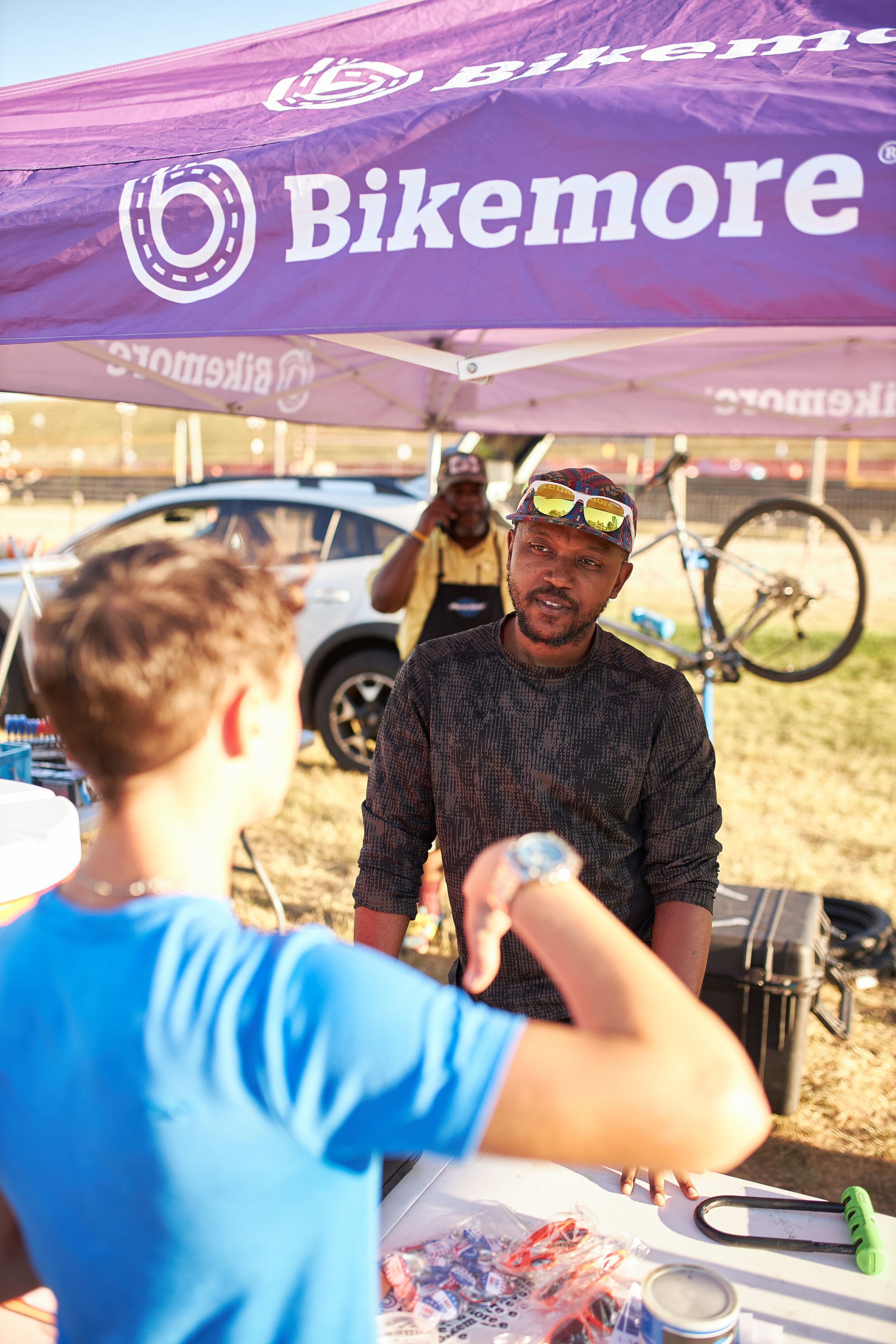At the end of August we welcomed two new staff members to the Bikemore team! Clarissa Chen joined Bikemore as our Operations Coordinator through Baltimore Corps to support the business operations and fundraising side of Bikemore, and Menelik Yeha joined the team as our Mobile Bike Shop Coordinator to lead our community outreach efforts.
What brought you to work with Bikemore?
Clarissa: For a long time, I was terrified of biking in a city. I grew up in one of those cushy suburbs where my friend taught me to ride when I was ten, and I was more hindered by erratic growth spurts than aggressive drivers, so the transition to biking in Baltimore intimidated me. I thought I couldn’t do it. The first time I went to Bike Party, though, the love within Baltimore’s biking community resonated with me, demonstrating something I’ve seen in all pockets of Baltimore: we empower each other when we act in community. I’m excited to empower all people with differing mobility needs and desires to get to where they need to go, because it’s our right to do so.
Menelik: Coming to Bikemore is something that I feel has been taking place for several years unbeknownst to me. As we're all familiar with the unpredictability life offers, I hadn't fathomed being part of the organization until the week I decided to apply. Although in one regard it can be seen as a kind of destiny, I'm seeing that passion and purpose can sometimes collide in a creative and rhythmic way. As a cyclist here in the city, I was only somewhat familiar in general with some of Bikemore's causes, namely community advocacy and bike infrastructure development. However, once applying and matriculating through the hiring process I was able to gain a much better understanding and insight. Precisely, it was this insight that gave me a feeling that I was becoming more aligned in a type of symbiotic way. Because I had previously chosen to have cycling as a lifestyle, my interpretation and relationship of the world around me, shifted over time from simplistic rider, to someone interested in cycling safety and making it easier for those operating vehicles significantly less than 100 lbs to get around. Learning about Bikemore’s initiatives in the city has further increased my interest in policies around the combination of safety, practicality and mixed use infrastructure.
What have you learned so far?
Clarissa: Many, many things - about bicycles, transportation, and myself (this is my first full-time job!). Perhaps something that has resonated with me the most is how transportation is one of the most tangible changes we can make to Baltimore that would improve our quality of life exponentially. Many of us are enraged at the systemic exclusion of marginalized groups from social mobility and opportunities to knowledge, wealth, capital, etc.. All of these are inextricably tied with a dysfunctional transit system; planners rapidly shifted streets to accommodate for cars and deprioritized streets for people. We’re disconnected from each other. A more equitable, comprehensive transit system consists of many things, and one of those is protected bike lanes -- because they’re accessible to many modes of transport and they’re fun.
Menelik: Prior to joining the Bikemore team, I was unaware just how far they were able to reach with their goals. The amount of experience and the impact that Bikemore has been able to make in a relatively short period of time has been phenomenal, particularly as a small group. The trials they have had with trying new ideas and uncommonly practiced ways of thinking are impressive to witness. A large component of what I have learned so far is that when we identify our strengths and practically utilize them as we would our limbs, the quality of growth and progress are more likely and potentially exponential. The creative ways of thinking and approaching goals are somewhat contagiously a part of my work now, to further implement not only what existed prior to me joining the team, but also to build on that foundation.
What are you excited about?
Clarissa: When Menelik and I joined Bikemore, our staff expanded from three to five. As I was learning about the strategic plan, the vision to have Bikemore grow and be an established force for advocacy and community-building meant that our budget has to grow as well. Right now, we are working on maintaining and growing our base of individual grassroots donors. I’m excited about the fact that this vision is built on the power of people: we need the help of our supporters, in whatever way or dollar amount, so that we can prioritize and support their needs in building a better bicycling Baltimore. Also, all our fun events that are coming up: check them out!
Menelik: Just several decades ago, Baltimore ranked 6th in the nation in local population. It was a fast growing city with intriguing opportunities and benefits, with many aspiring migrants arriving with the promise of future improvements in infrastructure, livability, and sustainability. Through the lens of construction and other associated industries, there were improvements in housing construction, roadway design and general aesthetics. Since then and for many reasons, Baltimore has declined in the aforementioned ways and, perhaps ironically, for the same reasons it was able to "grow". Assuming the worst of the decline is in the past, we can now take our time with implementing proper accessibility and overall livability meant not just for a city to grow in quantity, but for the people who qualitatively inhabit it. I am excited that I am able to synchronize with so many others as a small part of that experience.
If you haven’t met Clarissa or Menelik yet, be sure to come to an upcoming event!








